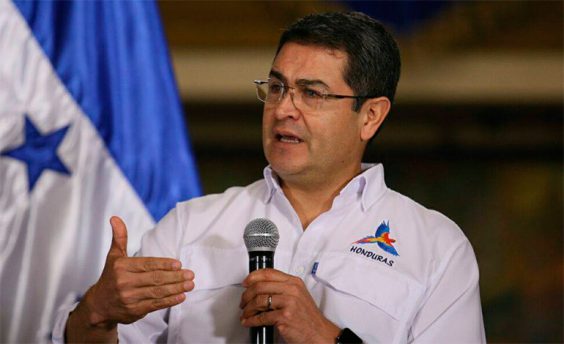Guillotining Journalists and the Two Pandora’s Boxes of the President of Honduras
by Dina Meza / May 5, 2017 / Comments Off on Guillotining Journalists and the Two Pandora’s Boxes of the President of Honduras

Honduran President Juan Orlando Hernandez. Image by La Tribuna
Newly enacted penal reforms endanger Honduran journalists. For the last several years, journalists in Honduras have been paralyzed by the threat of imprisonment for false accusations of terrorism.
Translated from Spanish by Katherine Wingfield-Dobbs
Imagine someone so repressed by self-censorship to avoid imprisonment: their neck lays under the blade of a guillotine. They are threatened with defamation and libel lawsuits. Things look worse now—as of March 30 when President Juan Orlando Hernández submitted new penal reforms through Article 335-B and the Law for Citizen Defense Against Terrorist Acts.

- Honduras has one of the world’s highest murder rates. It is also one of the most dangerous countries to practice journalism, ranking 129th out of 180 in the 2014 World Press Freedom Index. Journalists are regularly threatened, attacked, and killed for their work. The Honduran government fails to punish those who use violence against reporters, essentially granting them impunity. This space will be dedicated to examining the lack of protection for Honduran journalists exercising their profession. Topics will include the use of state-sponsored advertising as a mechanism to reward or punish publications, and censorship and self-censorship as hindrances to democratic progress.

- Born in Cofradía, Honduras, Dina Meza has been recognized by PEN International, Amnesty International, Index on Censorship and Reporters without Borders for her work as a journalist and human rights advocate. Currently, Dina is the driving force behind the creation of Honduras PEN Centre. In 2013, she wrote “Reign of Terror,” an in-depth report on threats to Honduran journalists for Index on Censorship’s magazine. In 2014, she was named one of Reporters Without Borders’ “100 Heroes and Heroines of Information.”
When Deputy Oscar Álvarez of the National Party introduced the reform, the Honduran College of Journalists—which is deaf to the violations of the rights of the journalistic guild—appeared to be publicly doing the President of the National Congress, Mauricio Oliva’s dirty work. The college’s President said that it would not go on the promise of the Leader of Parliament, but only stayed, as pledged, because the article is still there. However, different social communicators have stated that it is a gagging law to frighten journalists.
It was not enough for the President to include Article 335-B, but he also submitted this additional package of reforms to close any remaining loopholes that gave space to those who criticize the government or its allies.
It is about using criminal law to intimidate. Meanwhile the President who already seems like a juggler throwing repression around from different directions, has two Pandora’s boxes. On one hand he retains Article 335-B which threatens those who give the media thousands in advertising with arrest. Other social communicators and the media – especially the independent press, whom he does not have eating out of his hand – will face another Pandora’s box when he applies this reform to them with full force.
That makes two Pandora’s boxes. When opening them, who knows what other demons will be unleashed. What is certain is that Juan Orlando Hernández believes that he will have everything under control. As part of his reelection, he does not want mistakes that would prevent him remaining in the presidential chair for who knows how many more years. Meanwhile corporate media organizations aligned with President Hernández have cautiously come out to criticize these reforms.
The National Commission for Human Rights (CONADEH)—an organization that specializes in publishing press releases, but is incapable of attracting attention and initiating actions against the President of the Republic—have scarcely said that the article violates freedom of expression.
The President advances by leaps and bounds, his Machiavellianism reaching unimaginable extremes. Whilst he smiles for the cameras, he prepares more illegal actions intended to subjugate more demanding citizens.
As we progress into 2017— a great prologue to the November General Elections—the social climate begins to blaze, and Juan Orlando Hernández is recklessly pouring on the gasoline. He says he is concerned about terrorism, while he starts the machinery of State terrorism, a force deadlier than cyanide.
The Honduran Parliament is simply the Presidential Palace’s soundboard, ready to please a President with an insatiable appetite for power. Various sectors have stated that Hernández’s concentration of power has reached an unbearable level.
Sharpen the guillotine and be ready to open the two Pandora’s boxes. It is the perfect synchronization of illegality—those who step out of line must heed the consequences.
The almost carbon copy of the Citizens Security Law and the reforms to the Penal Code of Spain—which came into force on July 1, 2015—make it clear that the use of terrorism as a pretext for social control, is not just in Europe, but close to us.
But is there no solution in sight? Will one man subjugate more than eight million people? Who remembers the storming of the Bastille? Who remembers the French Revolution when the French people, tired of the monarchy’s tyranny, finally seized the reins of power? What will we do in Honduras?




